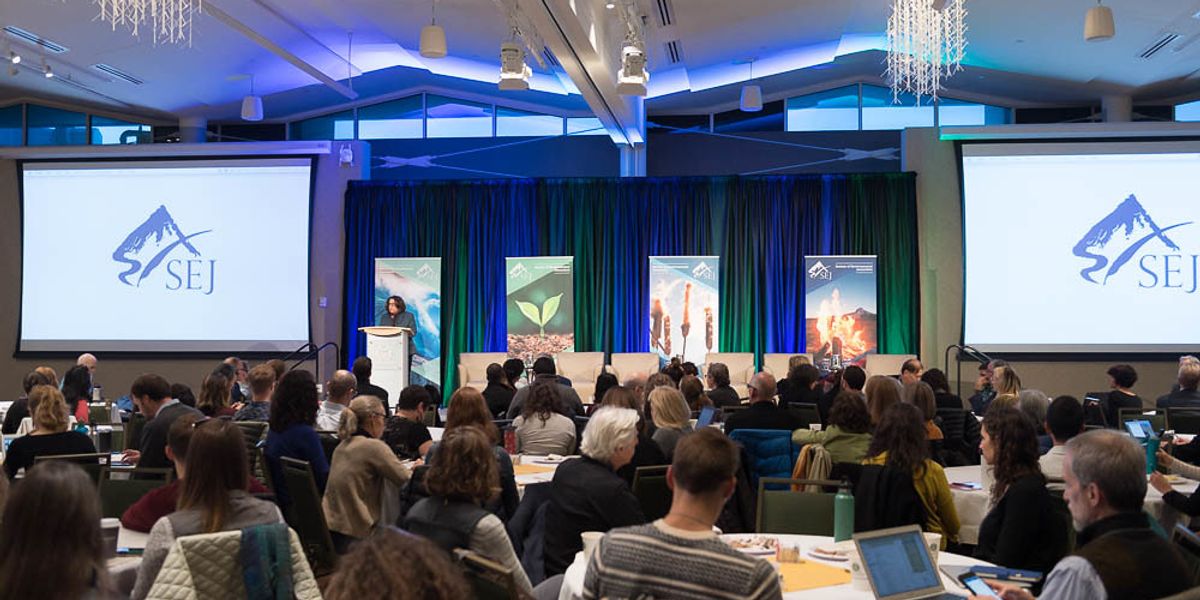
30 years of being (almost always) right
Environmental journalists have a long history of being proven right on key issues. Their trade group turned 30 this week.
It's an epic birth story that is, in all probability, also a true one.
In late 1989, ABC's rockstar reporter, Sam Donaldson, sat down for an interview with the Washington Post's Eleanor Randolph for the launch of his new show, Prime Time Live.
Randolph asked Donaldson if he considered his shift from daily prominence on the White House beat a demotion.
"I'm not walking away, kid," said Donaldson, no doubt in his trademark booming baritone voice. "No one's carrying me out or shifting me to the ecology beat."
For environment reporters, it was the diss heard 'round the world.
It's been retold dozens of times – and that's just being retold by me. But as the story goes, the hurt lasted until at least February 14, 1990, when a room full of scorned practitioners on "the ecology beat" responded by founding the Society of Environmental Journalists.
I joined SEJ soon after, and attended its second annual national conference in Ann Arbor, Michigan, and it was memorable for two things:
- I met valuable sources, ranging from Lois Gibbs to the late Chuck Cushman. Gibbs is the housewife-turned-activist firebrand from the contaminated Love Canal, NY, neighborhood. Cushman was the garrulous hellraiser nicknamed "Rent-a-Riot" for organizing western logging and ranching communities opposed to federal regulation.
- I met colleagues who became friends for life. It was clear from the start that the SEJ conferences served an ancillary purpose as a sort of Lonely Hearts Club for environmental journalists –as an annual gathering of people who were alone in their newsrooms and often derided as "treehuggers." All of a sudden, there were a few hundred like-minded people in the same room.
I watched and participated as SEJ grew and matured. It was the central nervous system for practitioners on "the ecology beat" so derided by Sam Donaldson.
Its ranks included several Pulitzer Prize winners like Mark Schleifstein, longtime SEJ board member who shared three Pulitzers; and Dan Fagin, onetime SEJ Board President whose book "Toms River" won the 2014 award for nonfiction.
Speakers at SEJ have included senators, governors, and cabinet members from both parties, Al Gore, the Cousteau Family, former UN Secretary General Ban-ki Moon, and many others. Members have toured fracking pads, wind farms, Superfund sites, Yellowstone and Yosemite.
The organization's far from perfect. Like so many things in the wider environmental realm, SEJ is overwhelmingly white. Though, through dozens of diversity initiatives, the organization has made a concerted effort in recent years to bolster the numbers of non-white members and has made environmental justice a core topic at its annual conference.
At least one SEJ participant gained fame for things beyond environmental reporting: Jayson Blair was a University of Maryland journalism student who attended the 1998 conference thanks to an SEJ Minority Fellowship. Blair's meteoric career arc found him at The New York Times by 2001, where two years later an editor at the San Antonio Express-News noticed Blair used paragraphs identical to those in a story in his paper. Subsequent investigations found multiple instances of apparent plagiarism and invented facts in Blair's body of work. He resigned in what became the first major U.S. journalism scandal of the 21st Century. He took the careers of the Times's Executive Editor and Managing Editor with him.
Blair's brief appearance is something that SEJ'S leadership – a cadre of volunteer board members plus its rock-steady staff – would prefer not to read. Perhaps it's time for a shout-out to Beth Parke, who stepped down in 2017 after more than a quarter century as SEJ's charter Executive Director; Meaghan Parker, her formidable eventual successor; Conference Director Jay Letto; and Deputy Director Chris Bruggers. Letto and Bruggers have also passed the 25-year mark in managing a sometimes-unmanageable group of a thousand-plus independent spirits.
Today's SEJ has changed as journalism has changed. For better or worse, it's outlived quite a few news organizations that used to provide members. As newspapers shrunk their staffs, the environment beat was often the first to go. Nonprofits have filled some of the void. Freelance journalists (or as I like to call them, subsistence journalists), now outnumber fulltimers.
The organization has matured in the best of ways. An annual Journalists' Guide to Energy and Environmenthas become a Washington fixture, with a discussion playing to SRO audiences each January. Reporting awards for print, broadcast, and web work on the beat draw hundreds of quality entries.
So, here's to SEJ's first three decades, and its role as the home base for what is often tragically prescient reporting on pollution, biodiversity, and environmental politics.
I like to think of it as the group of journalists that had climate change figured out 30 years ago. Visit www.sej.org , and once you're done generously contributing to EHN and the Daily Climate, throw them a buck or two.
Your return on investment will be a smarter, better informed population.
Peter Dykstra is our weekend editor and columnist. His views do not represent those of Environmental Health News, The Daily Climate or publisher, Environmental Health Sciences. He can be reached at pdykstra@ehn.org or on Twitter at @Pdykstra.














